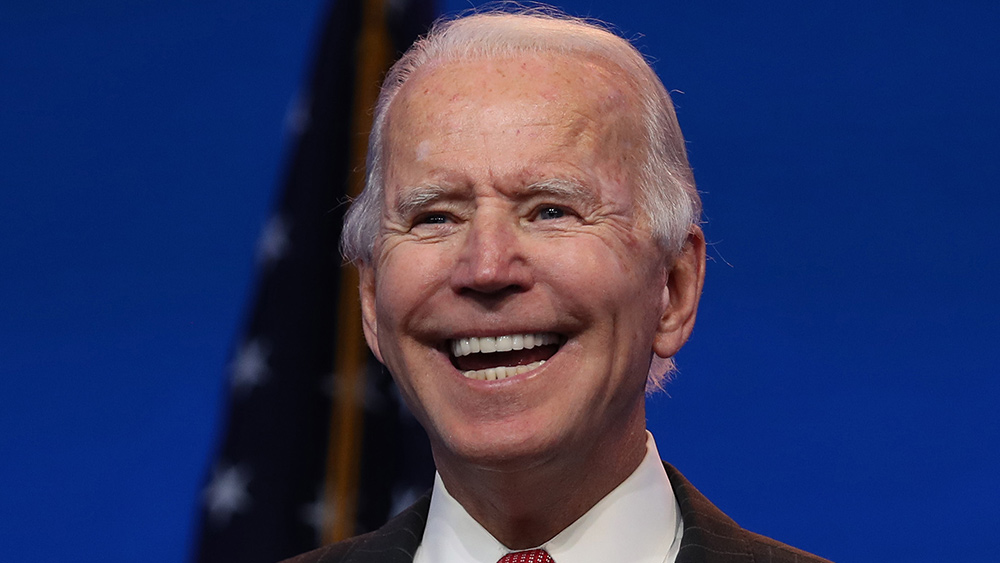German Vice Chancellor Habeck calls Biden administration’s unlimited fund for “green” projects a DECLARATION OF WAR
08/16/2023 / By Arsenio Toledo

The world’s economies, both large and developing, are competing to offer the best subsidies to corporations to kickstart their green energy industries.
But many countries, even those with more developed economies, are struggling to compete with the incentives being offered by the United States. The massive tax credits have even wrinkled American allies in the European Union (EU). German Vice Chancellor and Minister for Economic Affairs and Climate Action Robert Habeck even called American incentives “a declaration of war.”
“The [Americans] want to have the semiconductors, they want the solar industry, they want the hydrogen industry, they want the electrolyzers,” said Habeck during a business conference. “If we don’t keep up, they’ll have [the key green energy industries] and we won’t. That’s the brutal reality.”
Billions of dollars worth of taxpayer-funded subsidies are drawing in a flood of capital into the United States. Thanks to President Joe Biden’s Inflation Reduction Act and the Chips and Science Act, the U.S. has already offered $369 billion in incentives and funding for clean energy projects – and many, mostly foreign, corporations are rushing to take advantage of these gains. (Related: BILLIONS in taxpayer-funded subsidies are going to foreign corporations thanks to Biden’s signature climate law.)
In South Carolina, German carmaker BMW just broke ground for a new lithium-ion battery manufacturing plant. In Georgia, South Korean tech firms Hyundai and LG announced the development of a $4.3 billion battery plant. Japan’s Panasonic has announced a similar $4 billion initiative to supply batteries for electric vehicles in Kansas.
The Biden administration claims the billions of taxpayer dollars being given to massive corporations are necessary to reverse deindustrialization in deprived areas.
But as more corporations take the bait, the cost of developing these industries could double or even triple. A study by the University of Pennsylvania estimated that the final price tag of the Inflation Reduction Act could top $1 trillion. Other estimates suggest that it could cost around $1.2 trillion, as analysts from Goldman Sachs and Credit Suisse suggested that legislators underestimated the cost of the subsidies by as much as 300 percent.
World struggling to keep up with the US
Meanwhile, Germany has been struggling to offer its own incentives to corporations. Its biggest success to date is $11 billion in incentives to Silicon Valley tech giant Intel to build two semiconductor plants in the country. German Prime Minister Olaf Scholz called this the largest foreign direct investment in German history.
Corporations in Europe that have developed technologies in the continent are choosing to leave. British battery technology startup Nexeon, which developed technologies with the help of government funding, raised over $200 million last year. Its first commercial factory will be in South Korea, and it plans to build another plant in North America.
“But not the United Kingdom, sadly,” said Nexeon CEO Scott Brown, who claimed that the company is not getting enough support from the British government.
“The U.S. has adopted a simple strategy that immediately incentivizes businesses to invest while the EU is coming up with a political framework that lacks precise elements and misses simple, clear-cut reasons for businesses to invest,” noted Ilham Kadri, CEO of Belgian chemicals giant Solvay.
Outside of Europe, governments are similarly struggling. Japan, in an effort to become less dependent on China, has announced plans to borrow $150 billion to finance a wave of investment in green technologies.
The tens and sometimes hundreds of billions of dollars being spent on subsidies is making smaller countries like the U.K. and Singapore unable to compete due to the fact that they simply lack the scale to match the offers of the world’s largest economies and economic blocs.
“Let me tell you plainly: We cannot afford to outbid the big boys,” noted Singaporean Deputy Prime Minister Lawrence Wong, who noted that the subsidies Germany is offering Intel alone are substantially bigger than the annual budget of the country’s Ministry of Trade and Industry.
Learn more about the green energy transition at GreenTyranny.news.
Watch this episode of “Brighteon Broadcast News” as host Mike Adams, the Health Ranger, talks about Biden’s plan to declare a climate emergency and take direct control over American energy and food production.
This video is from the Health Ranger Report channel on Brighteon.com.
More related stories:
Demand for “critical” rare-earth minerals soars amid rapid growth of “clean” energy industry.
Sources include:
Submit a correction >>
Tagged Under:
big government, bubble, chaos, climate, corporations, economic riot, electric car batteries, electric vehicles, electricity, energy supply, finance riot, future tech, green energy, green living, Green New Deal, green tyranny, incentives, insanity, money supply, power, power grid, risk, subsidies, tax credits, White House
This article may contain statements that reflect the opinion of the author
RECENT NEWS & ARTICLES
GreenTyranny.News is a fact-based public education website published by GreenTyranny News Features, LLC.
All content copyright © 2018 by GreenTyranny News Features, LLC.
Contact Us with Tips or Corrections
All trademarks, registered trademarks and servicemarks mentioned on this site are the property of their respective owners.




















